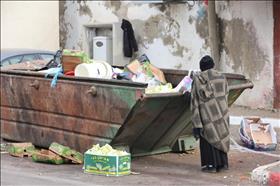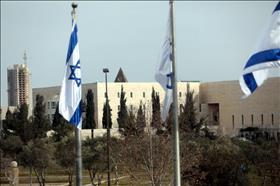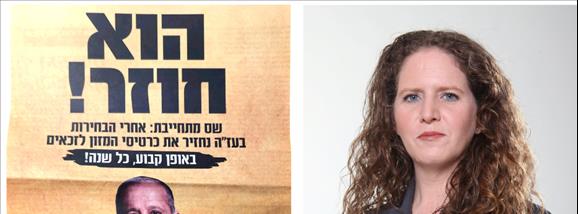Hiddush Advances Food Security, Halts Ultra-Orthodox Corruption
The Supreme court accepted a petition by Hiddush, which addressed the attempt by Rabbi Deri, leader of Shas, to funnel hundreds of millions of shekels annually to support voters of ultra-Orthodox parties under the guise of caring for food security
25/12/2024 10:12
Tags: Supreme Court · Rabbi Deri · food security · Hiddush

Looking for food in Ramle, a mixed Jewish-Arab city photo: Yossi Zamir, Shatilstock
With the recent successful culmination of one of our petitions to the Supreme Court, we have an opportunity to share the outcome with you that provides a glimpse of how our work is valued by others, through the ruling of the Supreme Court [released on Dec. 11, 2024], and a sample media testimonial.
The petition by Hiddush addressed the attempt by former Interior Minister, Rabbi Deri (leader of Shas] and his party to funnel hundreds of millions of shekels annually to support voters of ultra-Orthodox parties (yeshiva students) under the guise of caring for food security in Israel. Our petition uniquely focused not only on the legal and administrative flaws in Deri’s and Shas’s actions (used, as we demonstrated, to promote their election campaign) but also, and primarily, on the genuine importance of food security.
The Supreme court ruled that “The petitions before us address a matter of paramount importance: the assistance provided to low-income families in Israel for purchasing food… [The government change of policy] effectively addresses the main demand underlying the petitions…”
Quote from media coverage from Calcalist daily Dec. 9, 2024:
"… Shas had attempted to distribute food vouchers exclusively to those eligible for municipal tax discounts, a criterion that clearly favored the ultra-Orthodox community and yeshiva students…”
During the hearing, Hiddush Deputy Director attorney Yifat Solel emphasized the importance of ensuring that the government does not exploit the delay in distributing the budget until the end of the year to reduce it further. She called, instead, for the full allocation of the budget to food security. According to Solel, “This is a significant achievement that doubles the scope of the food security initiative. It represents a significant change in the lives of approximately 30,000 families, rather than merely being ‘holiday gifts’ bearing Deri’s name.”
The Supreme court: The petitions before us address a matter of paramount importance: the assistance provided to low-income families in Israel for purchasing food
Our petition was pursued with full coordination with professionals in this field and made a significant contribution both to genuinely assisting underprivileged groups in society, Jews and non-Jews alike, and to halting one of the channels of corruption characterizing the operation of ultra-Orthodox parties. We take pride in our ability to contribute this way to society and the state.
Translation of the Israeli Supreme Court Ruling (Summary):
At the Supreme Court Sitting as the High Court of Justice
Before:
Honorable Justice Daphna Barak-Erez
Honorable Justice David Mintz
Honorable Justice Yael Wilner
Petitioner in HCJ 6761/23: Hiddush – For Religious Freedom and Equality
RULING
The petitions before us address a matter of paramount importance: the assistance provided to low-income families in Israel for purchasing food.
… On September 7, 2023, this Court (Justice A. Stein) issued an interim order instructing the respondents to refrain from distributing funds under Government Decision No. 511 until a further decision was made [by the court].
… On September 23, 2024, an updated notice was submitted, indicating a significant shift in the position of the State respondents. The directors-general's team recommended that beginning in 2025 (i.e., next year), all projects for providing assistance in the area of food security will be consolidated solely under the Ministry of Welfare and Social Affairs.
Furthermore, "dedicated criteria" for the distribution of nutritional aid will be developed, "in a manner that will not require reliance on income tests established for other purposes, such as municipal tax (arnona) eligibility tests or income tests for receiving various National Insurance benefits." This change effectively addresses the main demand underlying the petitions…
Regarding the year 2024, which is nearing its end, it was reported that at the current time, a remaining budget of 300 million shekels remains. Of this amount, 210

The Israeli Supreme Court Yossi Zamir, Shatilstock
million shekels will be distributed by the Ministry of the Interior according to existing criteria, with significant amendments (e.g., granting full eligibility to “[minimal] income assurance” recipients and removing the limitation on the number of children considered for eligibility). The notice explained that reliance on existing criteria, subject to amendments, is necessary in light of the imminent conclusion of the fiscal year. The remaining 90 million shekels will be allocated to the Ministry of Welfare and Social Affairs’ food security project, of which 30 million shekels will be designated as a dedicated budget for the Arab public…
The petitioners’ representatives welcomed the achieved changes. However, they expressed regret over the lengthy process required to reach this point. The petitioner’s attorney in HCJ 6761/23, Dr. Yifat Solel*, particularly emphasized the importance of promoting ongoing food security by providing regular assistance to disadvantaged families, rather than one-time holiday gifts.
Considering the changes made and the contribution of the petitions to achieving them, we order the government respondents (Respondents 1–6 in HCJ 6371/23 and Respondents 1–4, and 6 in HCJ 6761/23) to bear the petitioners’ costs—15,000 shekels for each petitioner.
Issued today, 10 Kislev 5785 (December 11, 2024).
Daphna Barak-Erez
Justice
David Mintz
Justice
Yael Wilner
Justice
_______________
*The original amount allocated for "food security" was cut by 50% with the consent of the Shas party, following the realization that it could no longer primarily be distributed to supporters of ultra-Orthodox parties—yeshiva students. This was in contrast to other budgets demanded by these parties, which were not reduced and, in some cases, were even increased.
*Attorney Dr. Yifat Solel represented Hiddush.
Testimonial from the Media:
The Supreme Court Enables Equitable Distribution of Food Vouchers
By Shahar Ilan, Calcalist (09.12.24)
This morning , Supreme Court Justices Daphne Barak-Erez, David Mintz, and Yael Willner approved the revised and equitable framework for distributing Deri’s food vouchers…
Hiddush Deputy Director attorney Yifat Solel called for the full allocation of the budget to food security
Shas had attempted to distribute food vouchers exclusively to those eligible for municipal tax discounts, a criterion that clearly favored the ultra-Orthodox community and yeshiva students. In 2023, the Supreme Court permitted the allocation of 400 million shekels based on criteria that [while slightly revised] still discriminated significantly in favor of the ultra-Orthodox sector. This year, 390 million shekels were earmarked for distribution, but an interim injunction issued by the Supreme Court prevented their allocation under the old criteria.
This morning, during a Supreme Court hearing on petitions regarding the food vouchers, submitted by the Hiddush – For Religious Freedom and Equality organization and the Movement for Quality Government in Israel, the court decided to approve the new framework.
The revised plan includes transferring approximately 90 million shekels to the Ministry of Welfare’s food security initiative, including 30 million shekels specifically designated to the Arab community, which has been underrepresented in food voucher distribution. The remaining funds will be distributed as food vouchers based on equitable criteria, to both recipients of municipal tax discounts and recipients of various National Insurance Institute[Israel’s Social Security equivalent] benefits. This ensures that National Insurance recipients who were unjustly allocated reduced amounts last year will receive appropriate compensation.
During the hearing, Hiddush Deputy Director attorney Yifat Solel, emphasized the importance of ensuring that the government does not exploit the delay in distributing the budget until the end of the year to reduce it further. She called, instead, for the full allocation of the budget to food security. According to Solel, “This is a significant achievement that doubles the scope of the food security initiative. It represents a significant change in the lives of approximately 30,000 families, rather than merely being ‘holiday gifts’ bearing Deri’s name.”

Left:Shas Election Poster promising food subsidies Right: Attorney Yifat Solel, Deputy Director of Hiddush